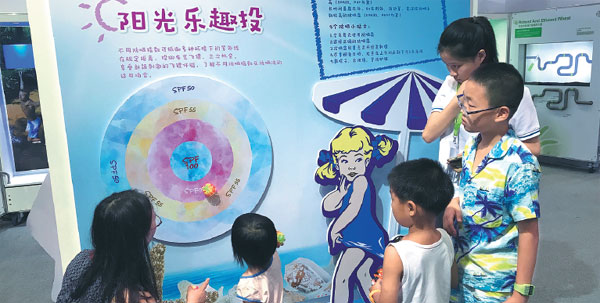Bayer Better Life Hall teaches families self-care knowledge
|
Children learn about the benefits of sunscreen knowledge at Bayer's booth of the ninth China Children and Women Industry Expo in Beijing. Photos Provided to China Daily |
The ninth China (Beijing) Children and Women Industry Expo kicked of at the China National Convention Center on July 14, gathering more than 300 brands in the fields of science education, health, entertainment, parenting and food.
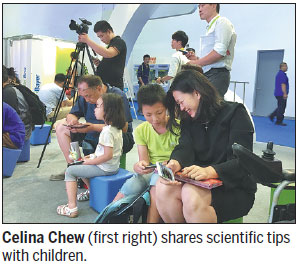
Bayer Better Life Hall was unveiled during the parenting carnival as a comprehensive interactive exhibition of life sciences, popularizing scientific knowledge among children and their parents, and promoting healthy lifestyle concepts.
Bayer Better Life Hall was first launched in 2013. It has been held in Shanghai three times, attracting nearly 60,000 visitors. It has gradually evolved into a platform for science education and entertainment.
With lively and interactive exhibits and themed activities in the series, this year's exhibition attracted a good number of visitors to the scene.
"I'm very pleased to see the success of Bayer's LifeScience Expo in Beijing this year. This platform helps us to raise awareness among the general public about self-care and healthy lifestyles, and to encourage people to take better care of themselves," said Celina Chew, president of Bayer Group Greater China.
Bayer believes strongly in the importance of life sciences because the more we understand about our bodies, our environment and the science of life, the better we will be able to make good decisions to improve our health and happiness, Chew said.
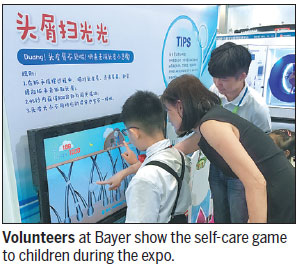
Visitors can also play games and take selfies at the exhibition. The games were designed based on scientific knowledge in the fields of self-care, cardiovascular health, pet health and crop health.
The exhibition's aim is that, through learning to take care of themselves and the people, animals and plants around them, each child will learn how to become a little expert in the life science field.
Through many fun games that challenge their hands and brains, both children and their parents can enjoy themselves as well as gain a lot of practical life science knowledge.
Take the Mommies and Babies game as an example. By matching different nutrients into pairs, children understand the variety and role of the nutritional elements that mothers need while they are pregnant.
In the game of Pest Toss, visitors could simulate the situation in defeating various pests that may cause different diseases in crops by throwing little steel balls at the pest models.
The on-site lecture about professional pets knowledge outlined effective methods for pets' daily care and common problems that may be caused by raising pets.
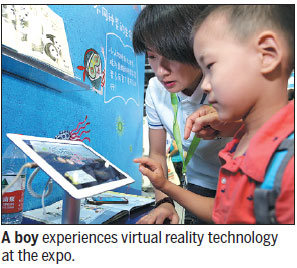
A lecture on hemophilia delivered by Liu Shufen, a doctor from Peking Union Medical College Hospital, raised public awareness of the disease.
Through the lecture and related activities, visitors gained basic knowledge about the disease, learning about the way it is inherited, the major symptoms and the treatment methods.
According to Liu, the incidence of the disease in China is five to 10 in 100,000. She said the cost for a family with a 10-year-old hemophilia child is really high, as they have to pay more than 3,000 yuan ($443.21) per week to inject the blood coagulation factors.
On the same day, Bayer was announced as a founding member of China's first Self-Care Union, launched on July 14, led by the China Population Education Center of the National Health and Family Planning Commission.
The union's mission is to promote self-care among the Chinese public under the joint efforts of the union members, including government departments, NGOs, experts, the media and prominent companies.
At the launch ceremony, the president of Bayer Consumer Health Division China, Lance Yuen, shared Bayer's experiences of promoting self-care and expressed the company's commitment to the sustainable development of self-care in China.
"Bayer is dedicated to using science to deliver more innovative products and solutions to enhance human, plant and animal health, and through this, contribute to a better life for all," Chew said.
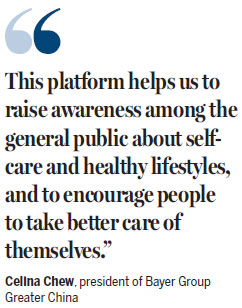
About the company
Bayer is a leading global innovator in the fields of healthcare and agriculture. It has committed to developing innovative products and solutions to improve the health of humans, animals and plants.
Bayer's links with China date back to 1882. Bayer started producing Aspirin in Shanghai in 1936 and the company established a pharmaceutical production and packaging facility in Beijing from 1995 to 1997.
Greater China is Bayer's largest single market in Asia, accounting for sales in the LifeScience business of more than 2.67 billion euros ($3.06 billion) in 2016.
Over the years, Bayer has contributed to providing medical education opportunities to healthcare professionals, especially in less developed areas.
In the "Go West" project, Bayer had provided education opportunities for more than 30,000 doctors and hospital executives in 26 provinces via 227 training courses by the end of 2016.
(China Daily 07/24/2017 page15)


